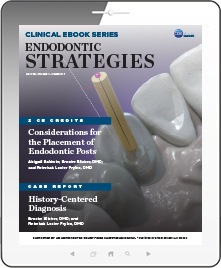CDEWorld > eBooks > Endodontic Strategies


ADA CERP is a service of the American Dental Association to assist dental professionals in identifying quality providers of continuing dental education. ADA CERP does not approve or endorse individual courses or instructors, nor does it imply acceptance of credit house by boards of dentistry. Concerns or complaints about a CE provider may be directed to the provider or to ADA CERP at www.ada.org/cerp/

Approved PACE Program Provider. FAGD/MAGD credit. Approval does not imply acceptance by a state or provincial board of dentistry, or AGD endorsement. 1/1/2023 to 12/31/2028. ID # 209722.
eBook
Released: Friday, May 19, 2023
Expires: Saturday, January 31, 2026
Endodontic Strategies
Commercial Supporter: Carestream Dental
This thematic CDEWorld eBook features a continuing education (CE) article on the placement of endodontic posts. This article reviews the considerations involved in post placement, including the indications and contraindications of post placement, the post selection criteria, and the risks associated with post and core procedures. A case report article on the history-centered diagnosis of endodontic disease is also included in this eBook. Download to earn 2 FREE CEU now!
FEATURED CONTENT
CE: Considerations for the Placement of Endodontic Posts
Abigail Baldwin; Brooke Blicher, DMD; and Rebekah Lucier Pryles, DMD
With a multitude of adhesive and restorative options at their disposal, clinicians should exercise careful case selection when considering post placement. This article examines the indications and contraindications for post placement in endodontically treated teeth, the risks associated with post placement, post selection criteria, and evidence-based protocols for placement.
Credits: 2 Self-Study CEU
Cost: $0
Provider: Conexiant Education
History-Centered Diagnosis
Brooke Blicher, DMD; and Rebekah Lucier Pryles, DMD
This case report article explains how diagnosing endodontic disease requires the careful compilation of subjective and objective data. The information obtained from patients during the subjective examination guides the gathering of objective data during the clinical and radiographic examinations. Two case studies illustrate the importance of history taking and eliciting patient-reported symptoms in obtaining an accurate diagnosis of endodontic disease.


